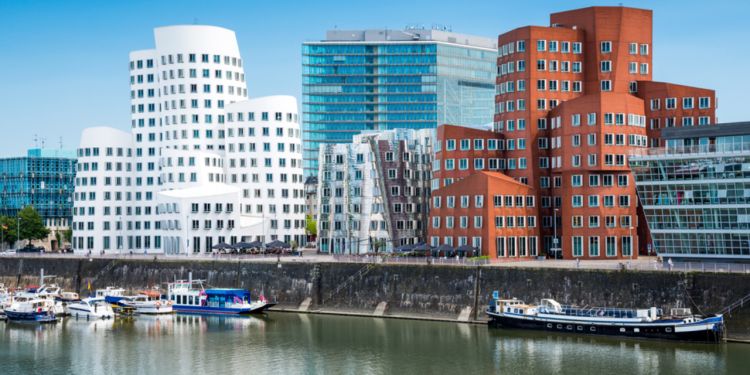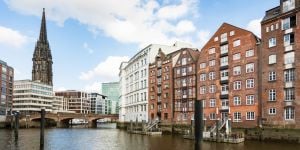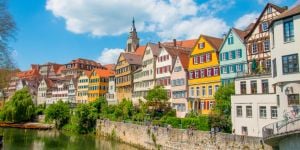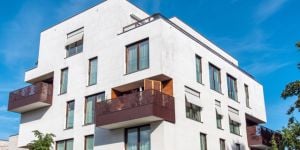
Düsseldorf is one of Germany's most popular cities among expats thanks to its diverse economy and attractiveness to international investment. At the same time, the cost of living in Düsseldorf is relatively low, while the quality of life is high. Finding accommodation and settling in the city may be one of the best decisions you ever make, as you will enjoy a cosmopolitan lifestyle, opportunities for thriving in your career or starting your own business in Germany, and a place to call home.
Reasons to set up home in Düsseldorf
Düsseldorf, the capital city of North Rhine-Westphalia and the seventh-largest city in Germany, is well-connected to the rest of Europe and particularly close to some of Europe's most significant hubs, such as Paris, London, Brussels, Amsterdam, and Zurich. Düsseldorf's Flughafen International Airport is less than nine kilometers away from the city center and operates flights to no less than 176 destinations. Hence, it comes as no surprise that over 37,000 companies are based in Düsseldorf, of which 17 percent are non-German. In fact, in the past 20 years, over 2,000 new international companies have established their operations in Düsseldorf. Even though the city's population is about 640,000 people, on weekdays, when commuters arrive in the city, Düsseldorf counts over one million people.
Besides Düsseldorf's vibrant business environment, the city offers excellent primary, secondary, and higher education, fair access to social security and assistance, and support to vulnerable residents such as people living with a disability. Last but not least, Düsseldorf values its young population and takes initiatives to encourage the creation and well-being of families, as it recognizes that the contribution of all generations is crucial for the prosperity of the city. Among other benefits, if you live in Düsseldorf with your family, apply for the family card to receive discounts and deals on family activities such as dining out, doing sports, and shopping.
Düsseldorf's neighborhoods
One of the main criteria for finding accommodation in Düsseldorf is the type of area you want to live in. Stretching over some 217 km², Düsseldorf is bordered by both banks of the River Rhine. Some of the city's popular neighborhoods, namely Oberkassel, Heerdt, Lörick, and Niederkassel, are found on its left bank. Düsseldorf is divided into ten districts (i.e., Stadtbezirke), including some fifty neighborhoods (i.e., Stadtteile). The most sought-after neighborhoods are around the city center, namely Bilk, Unterbilk, Altstadt, Derendorf, Pempelfort, Golzheim, Oberkassel, Carlstadt, Stadtmitte, and Friedrichstadt. These urban areas are full of restaurants, bars, shops, shopping malls, pubs, and nightclubs and are easily accessible by public transport. Thus, they attract mostly young couples, professionals, and students.
Friedrichstadt is a central neighborhood, friendly and lively, close to Südpark — Düsseldorf's biggest and most visited park with a 30-kilometer network of paths surrounding ponds, themed gardens, and artwork. Pempelfort, in the West of Düsseldorf, has higher accommodation prices, as this high-end part of the city offers plenty of galleries, shops, and art centers. Carlstadt, along the Mannesmannufer riverbank, is probably the most central and sophisticated residential area, offering magnificent buildings with a fantastic view over the Rhine towards Oberkassel. Düsseldorf's MedienHafen in Unterbilk is a former trading port, which is now a fashionable business and entertainment site with many architectural highlights. More exclusive central areas are Zooviertel, Grafenberg, Pempelfort, and Weiße Siedlung. Oberkassel and Golzheim are known as Düsseldorf's posh neighborhoods and are characterized by luxury apartments, houses, and villas, as well as modern shopping malls and trendy boutiques.
Good to know:
Düsseldorf's public transport system is well-established, and the city is well-connected with the rest of Germany. So, if you are on a tight budget, you may consider commuting to your work in Düsseldorf from surrounding and more affordable towns such as Duisburg or Ratingen.
Types and cost of accommodation in Düsseldorf
Düsseldorf offers a range of accommodation options — apartments, studios, and detached houses. If you prefer more affordable accommodation, you can consider a homestay or a shared apartment with other students or young professionals (a Wohngemeinschaft or WG in German). Both furnished and unfurnished apartments are available in Düsseldorf. However, in the case of an unfurnished apartment, you are likely to find a completely empty kitchen without any appliances (e.g., fridge, oven, stove, dishwasher). Be prepared to set aside some money for furnishings and appliances if you decide that this is the most suitable option for you.
Rental prices in Dusseldorf are more affordable than in other German cities. Like in all German cities, rent in Düsseldorf varies according to the type of housing, neighborhood, and comfort level. In short, you will need an average of 1200 euros per month to rent a single-bedroom apartment in the city center and an average of 1,800 euros per month for a three-bedroom apartment. In the outskirts, rent prices for a single-bedroom apartment are around 700 euros monthly, and for a three-bedroom apartment, 1300 euros per month.
Student accommodation in Düsseldorf
If you are a student in one of the six universities in the area (Heinrich Heine University Düsseldorf, Düsseldorf University of Applied Sciences, Kunstakademie Düsseldorf, Robert Schumann University of Applied Sciences Düsseldorf, Niederrhein University of Applied Sciences, Rhein-Waal University of Applied Sciences), you can apply for student housing, which is much more affordable than private accommodation. Plus, living in a student hall helps expand your social network and make new friends faster, as well as save time and money on transport, as you are usually located close to your campus.
If you wish to be considered for a student residence, you should submit your application well in advance, as student halls are very popular and in high demand. An application does not guarantee you a place, but you will be immediately added to the waiting list. Note that in order for your application to be considered, you must provide a passport-sized photo and proof of enrolment in the program (check for the exact size of the passport photo as Germany is very strict with this). From the moment your application is submitted, you will be contacted every month to confirm whether you still wish to be considered for accommodation. If your answer is yes, you will remain on the waiting list and climb up the list.
In most student halls, utility bills are included in the total rent price. However, in some cases, you may have to pay electricity bills separately directly to the provider. Before you move in, you must pay a deposit of three months' rent, which you will receive back when your tenancy is over and if you haven't done any damage to the property. Subletting to another student is possible during the holidays or during study-related absences (e.g., studying abroad or internship abroad). Note that you cannot stay in a student residence for more than six semesters. If you have any issues, student halls usually have tutors who are students themselves and are available to help you.
Good to know:
Most student halls meet the accessibility requirements for students with a disability. Also, there are special apartments for students with children and families.
Finding accommodation in Düsseldorf
To find accommodation in Düsseldorf, you can start by doing online research. If you are reading this article, this is probably exactly what you have been doing. In addition to our guidance, you are encouraged to start a conversation in Expat.com's friendly Düsseldorf Forum, where you can ask seasoned expats about their experience of finding accommodation in the city and relevant tips when dealing with agents or house owners. Also, you can check out classified ads in local newspapers such as the Rheinische Post on Wednesdays and Saturdays and RP Online. Living in Dusseldorf has many advantages, and right after finding your place, you can immediately start enjoying the great fun that the city offers.
Before taking an apartment, you will have to consider some crucial elements, such as:
- Is the apartment (fully) furnished?
- Are utility bills included in the rent price (Warmmiete), and if not, how much will they be per month?
- Are cleaning services for the apartment and the building included?
- Is there a minimum rental length on the contract, and what is the notice period if you need to leave the place?
- Is the place pet-friendly?
- Can you smoke in the house?
- Are children welcome?
Important:
Remember to register at the Residents' Registration Office after you move into your new home.
Useful links:
We do our best to provide accurate and up to date information. However, if you have noticed any inaccuracies in this article, please let us know in the comments section below.











